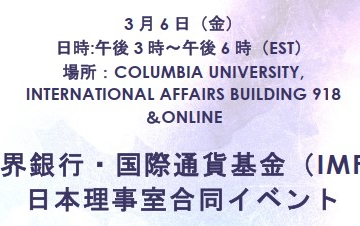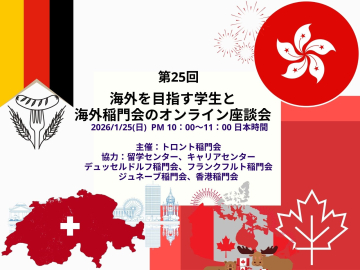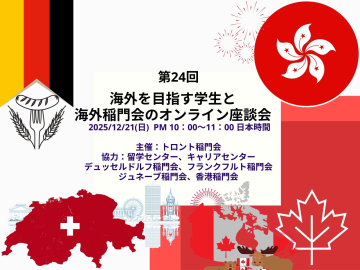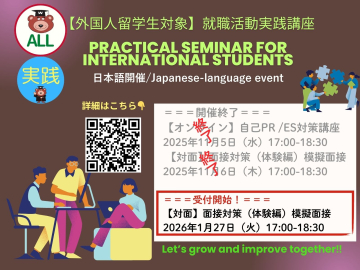We consider the concept of “Think straight, talk straight” important at work and during job interviews.
Regarding job hunting, what kind of talent are recruiting companies looking for in students? Also, what are the new employees’ impressions of their company? These questions are probably on the minds of many students. This time, one of our SCVs (*) at the Career Center went to interview an HR manager at Accenture and one of their young employees.
Accenture is among the lead recruiting companies of Waseda graduates in the consulting industry, a field that is increasingly popular. SCV Ryoto Nakamura (4th year at the School of Human Sciences) learned about Accenture’s corporate culture of placing importance on straightforward communication and realized that this is also an important point during job interviews.
(*) Student Career Volunteer. Student volunteering at the Waseda University Career Center for events, planning, operations, spreading information, etc.
Accenture Japan Ltd
Miho Fukuda: New graduates recruiting manager, HR division for recruiting (graduated the School of International Liberal Studies in 2012)
Natsuki Kamata: Business consultant (graduated the School of Culture, Media, and Society in 2021)
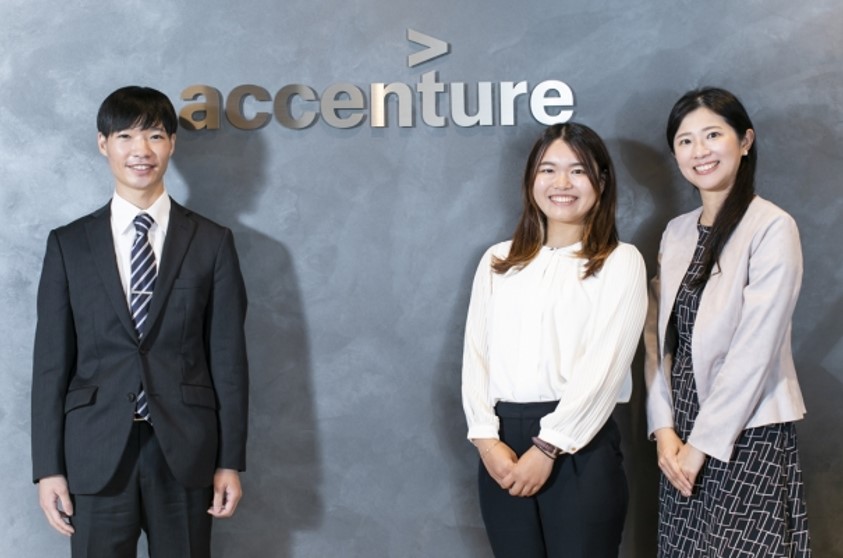
(From left) Nakamura, Kamata, Fukuda at the Accenture Tokyo Office
Under rigorous support, there is an environment for growth
Nakamura: I feel that the consulting industry is getting really popular, but could you explain how to interpret this? Also, could you tell us about your company’s strengths and characteristics of your job?
Fukuda: One of the reasons for the popularity of the consulting industry is that it is an environment that allows for an unparalleled growth. You can move up in any company, but one of the peculiarities of the consulting industry is that you require a high level of expertise to make suggestions of how to solve the problems of clients who can be professionals with decades of experience in their fields. So, for those who want to master the skills to survive as a business person, this can have a very special appeal.
Accenture business areas: End to End support, from strategy to implementation
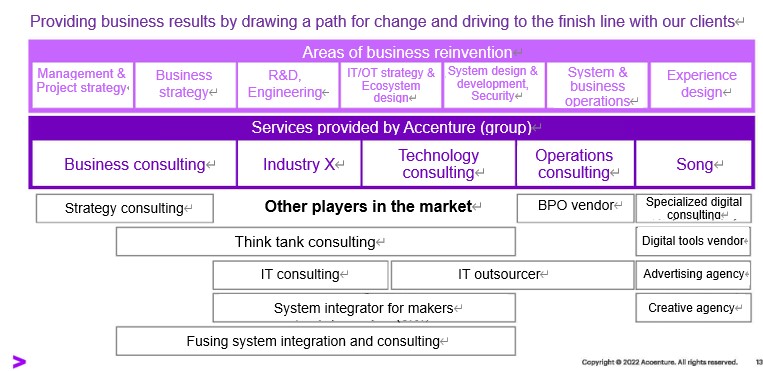
Also, the diversity of careers possible at Accenture is one of its strengths. New graduates are recruited by job categories, so they can choose what they want to do when entering the company. As they get involved in diverse projects, they can gain expertise in various fields. They can not only select the projects they want to take part in, but can also make requests for a job category or division of their choice to steer their career in the direction they want. I think that, even in the consulting industry, the vast array of career options offered by Accenture stands out.
Nakamura: You said that you recruit by job categories, but on what should students base their selection?
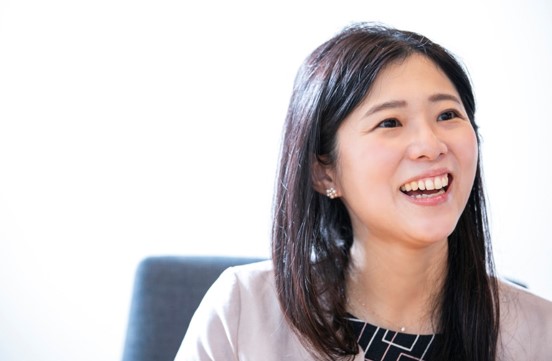
Fukuda: Students follow two different patterns. First, those who want to make use of the specialized skills they nurtured as students. For example, data scientists, AI architects or designers have studied those specialties at school, and many people apply after having accumulated a certain amount of experience. On the other hand, the people who have no set specialty should select their job category based on their forthright personal interest, or vision for their future.
People join our company for various personal reasons. While there are people who want to start a business, there are also many people who have not decided yet what to do in the medium-to-long term. The most common job category at Accenture is the “business consultant” who takes part in the planning of various projects using technology as an asset, but, after gaining such experience, some people discover their own field of expertise. So, as it is possible to change job categories, we recommend first selecting one in the field that interests you.
Nakamura: Some people join the company because they want to start their own business in the future. Is it even possible for them to join the company if you know they’ll quit it at some point?
Fukuda: People are often surprised to hear this, but the answer is yes. We tell them to look at Accenture as a platform that can realize what they want to achieve, and to make full use of it. I myself was a mid-career hire, but on my first day here, the president at the time said that in a speech, and I remember being shocked by it.
Of course, we want employees who fit here to work with us a long time, but if there is something they want to achieve, someone they want to become, or a job they want to do, we offer them the basis of a culture that respects those wishes. As such, there is absolutely no need to devote one’s life to the company. Choosing a “positive graduation” from the company is also an acceptable option. Because of this, there are also many alumni who rejoin Accenture after their “graduation.”
There is a network of Accenture alumni.
Nakamura: Please tell us about the corporate culture. Also, what kind of support system is there for new employees?
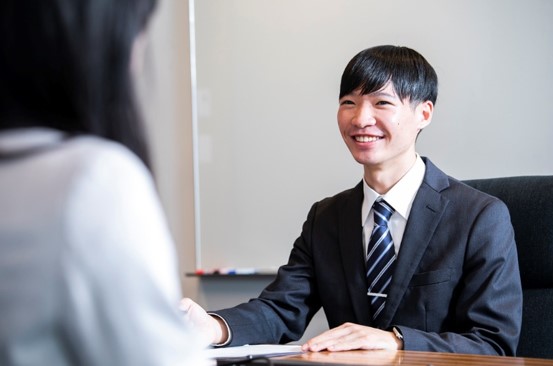
Fukuda: The corporate culture at Accenture is based on the concept of “Think straight, talk straight.” We have employees with various backgrounds and values, so we think that being able to present straightforward ideas in a straightforward manner allows us to come up with proposals that are best for the clients and society. Straightforward does not mean arguing, but instead, accepting each other’s opinions and discussing them constructively in order to create something better together.
There is thorough training for new employees, so there is nothing to worry about. After learning the basics for a few months, each employee is assigned to a project under a supervisor to provide rigorous support.
There are also supervisors, called “People Leads,” who are appointed to each employee. When a project is completed, its team is dismissed, and all members are reassigned to different projects. There, the People Lead will observe at medium to long term their employee’s growth, degree of contribution, and challenges, while giving career advice or feedback. There are regular face-to-face meetings, but employees can also easily get in contact through chat and such to discuss anything.
Nakamura: Please tell us about future business developments or about the vision of what the company is aiming to be.
Fukuda: Accenture has a mission to “realize the unseen future through the ingenuity of technology and people.” Within this, we highly regard the “360° Value” reporting experience. Consulting is a job where we make proposals to clients in pursuit of profits, yet this includes not only proposals for financial benefits but non-financial indicators, too. For example, we take into consideration talent, experience, and sustainability, and we think that not limiting ourselves with our client companies but also creating better values for society as a whole will become an axis in the future.
Nakamura: What kind of talent are you looking for? Also, since you are a foreign company, are there high language skill requirements?
Fukuda: We are looking for a wide variety of people. If you can fit just one of the following, please look into coming to work for us.
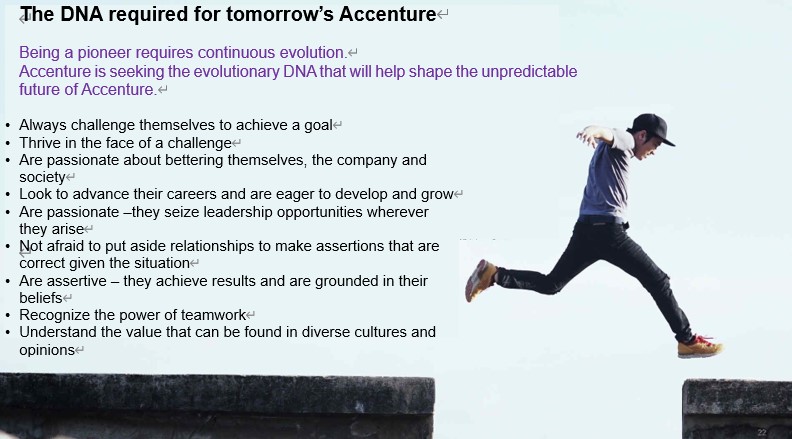
From people at their best when facing challenges to sincere individuals, Accenture is looking for various talent (document provided by Accenture)
Regarding language skills, we have many students who join us even if they are not so proficient in English. However, once on the job, brushing up on English skills becomes important. With English proficiency comes a wider selection of projects or careers, and we tell our potential new employees during our company information sessions that they will have to work on that.
Nakamura: What should the students be careful about during the interviews and such? Also, please tell us what characteristics in some students impressed you the most.
Fukuda: We want students to remember that an interview is a conversation. Sometimes people can be so nervous that they give a prepared answer without answering the question asked, or panic because they are in such a rush to say what they want to say and don’t properly listen to what we said, and this can lead to such missed opportunities. On the contrary, anyone with questions for the recruiters should feel free to ask them. We want people to communicate without forgetting that an interview is like a verbal game of catch.
Also, people who can relate their personal experiences in their own words often leave a positive impression during interviews. I feel that when people use their own words instead of sounding like they borrowed them from somewhere, I got to listen to a good story and that good communication was established.
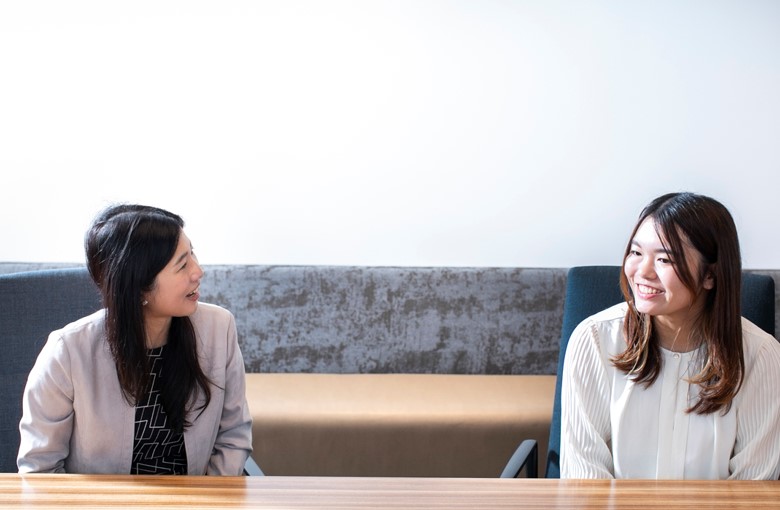
The young Kamata, too, recalls how she was told at the beginning of her final interview that “an interview is a place for communication and, as such, you should say what you feel.”
When job hunting, having to decide where you want to work is a decision that’s hard to make for those with no work experience, but being honest about your feelings is important. You shouldn’t just be picked by a company. First, remember that you are in a position to choose, and we want people to think carefully about which company they really want to work at, and if that path is the best for them or not.
The presence of many employees with warm personalities is one of the best things about working here.
Nakamura: Could you tell us your reasons for applying to Accenture?
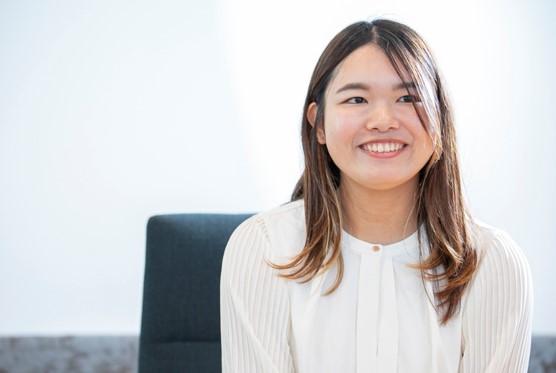
Kamata: When I was a student, I had difficulty in identifying a long term career for myself, and since there were too many choices, I thought that I should see the wider world and meet many people. With that in mind, I learned at Accenture’s company information session about the wide choice of job categories and the diversity of their employees. I needed to become able to do what I really wanted once I found what it was, so I chose Accenture because I felt that I would be able to get those skills in such a fulfilling environment.
Also, I hate unreasonable things! That is why I think that Accenture’s culture of “Think straight, talk straight” just felt right to me.
Nakamura: Was there anything that differed from the assumptions you had before joining the company?
Kamata: I had this image of consultants for foreign companies doing tasks on their own, but in reality, there are so many helpful people that are there to help, and in a good sense, this was unexpected. People help you when you need it, and the regular firm support makes it easy to work here.
Nakamura: Could you tell us about your current job?

Kamata: I joined the company in August (*) of 2021, and after a two-and-a-half-month training period, I have been involved in a cloud system implementation project since November of that year. My job is the systematization and analysis of our client’s business management situation, and to propose business improvements. I graduated from the School of Culture, Media, and Society, so I was nervous because I had absolutely no knowledge in programming, but with the support of other employees, I was able to somehow catch up.
(*) Accenture’s new employees join the company in waves from April to August.
Nakamura: What are your career plans?
Kamata: The place where I want to live is for me a key factor, so a criterion of my career selection was finding what kind of job I could do to be able to live there. Most of my work is done remotely, so, since I joined the company, I have moved to Enoshima, and I now feel how great it is to live in a place you like with people you like.
Another criterion for my career is to base it on what I want to do. I already had interest in local businesses and regional revitalization, and from the time I graduated college to the time I joined this company, I was involved in community development with an NPO in Iwate Prefecture. So I think I want to do work at Accenture involving regions.
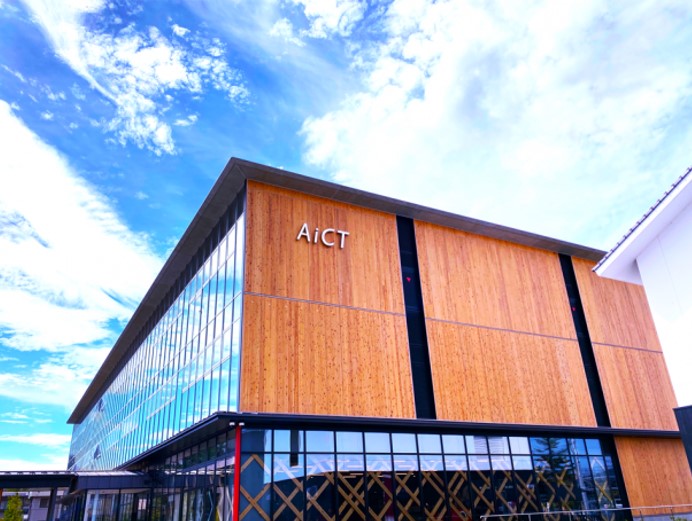
The Accenture Innovation Center Fukushima, in Fukushima Prefecture’s Aizuwakamatsu City, has been conducting demonstrations using digital technology. It is one of the work locations that interests Kamata.
Interview and text: Fuyuko Kobori (graduated the School of Political Science and Economics in 2009)
Photography: Kota Nunokawa
The importance of being oneself during interviews
Ryoto Nakamura, 4th year at the School of Human Sciences
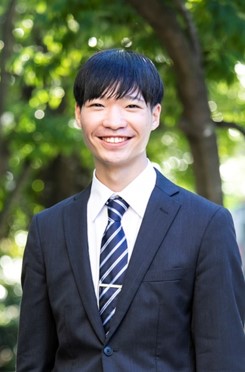
Everyone at Accenture was very ambitious, and under the concept of “Think straight, talk straight,” it is a company where employees derive the best solutions by exchanging opinions. I found such corporate culture attractive.
Also, manager Fukuda talked about how an “interview is like a verbal game of catch.” The “talk-as-you-are” part made a great impact. In fact, Kamata said that she was asked during her final interview to make conversation while relaxing. During a job interview, you can’t help but feel tense. I think that the recruiters, too, want to have a dialogue with the students “as they are,” so future job-seeking students should definitely remember those words.
This time, being able to interview people at Accenture, a company popular among Waseda students, was a rewarding experience for me, too, even though I had already finished my job-hunting process. I think I will not set my goals at just getting a job, but will instead work while always thinking about how to better myself.
※Read the original report(made in December of 2022) in Japanese from HERE!

